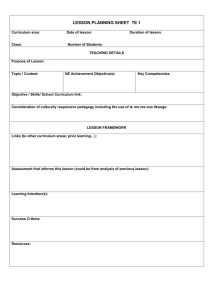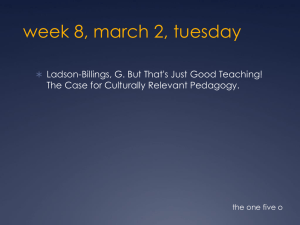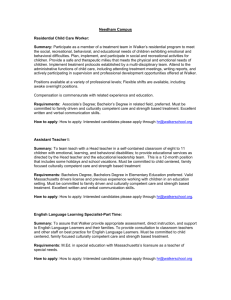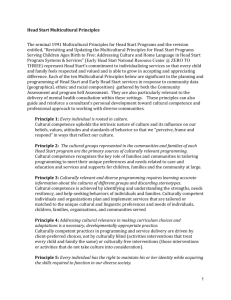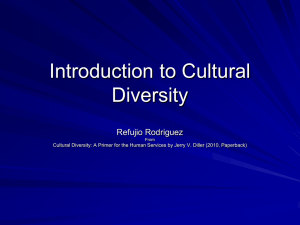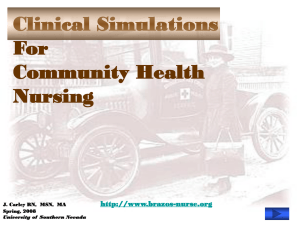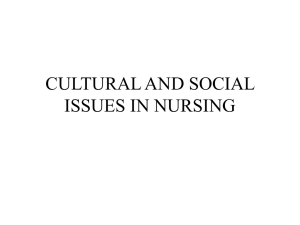2-page proposal file
advertisement
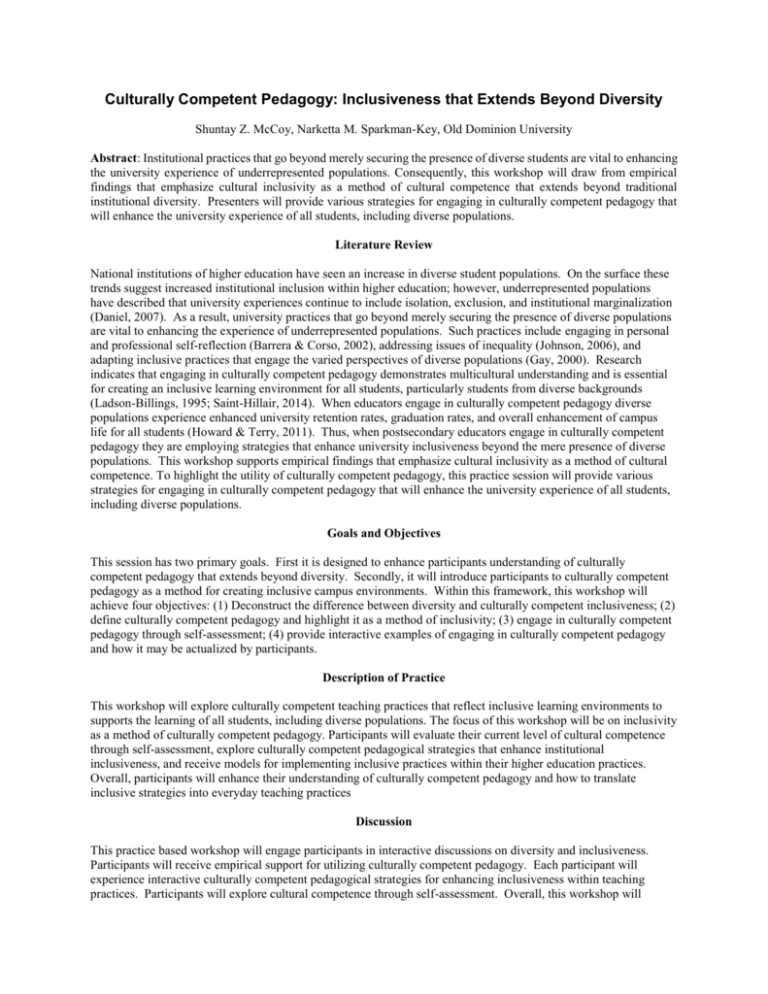
Culturally Competent Pedagogy: Inclusiveness that Extends Beyond Diversity Shuntay Z. McCoy, Narketta M. Sparkman-Key, Old Dominion University Abstract: Institutional practices that go beyond merely securing the presence of diverse students are vital to enhancing the university experience of underrepresented populations. Consequently, this workshop will draw from empirical findings that emphasize cultural inclusivity as a method of cultural competence that extends beyond traditional institutional diversity. Presenters will provide various strategies for engaging in culturally competent pedagogy that will enhance the university experience of all students, including diverse populations. Literature Review National institutions of higher education have seen an increase in diverse student populations. On the surface these trends suggest increased institutional inclusion within higher education; however, underrepresented populations have described that university experiences continue to include isolation, exclusion, and institutional marginalization (Daniel, 2007). As a result, university practices that go beyond merely securing the presence of diverse populations are vital to enhancing the experience of underrepresented populations. Such practices include engaging in personal and professional self-reflection (Barrera & Corso, 2002), addressing issues of inequality (Johnson, 2006), and adapting inclusive practices that engage the varied perspectives of diverse populations (Gay, 2000). Research indicates that engaging in culturally competent pedagogy demonstrates multicultural understanding and is essential for creating an inclusive learning environment for all students, particularly students from diverse backgrounds (Ladson-Billings, 1995; Saint-Hillair, 2014). When educators engage in culturally competent pedagogy diverse populations experience enhanced university retention rates, graduation rates, and overall enhancement of campus life for all students (Howard & Terry, 2011). Thus, when postsecondary educators engage in culturally competent pedagogy they are employing strategies that enhance university inclusiveness beyond the mere presence of diverse populations. This workshop supports empirical findings that emphasize cultural inclusivity as a method of cultural competence. To highlight the utility of culturally competent pedagogy, this practice session will provide various strategies for engaging in culturally competent pedagogy that will enhance the university experience of all students, including diverse populations. Goals and Objectives This session has two primary goals. First it is designed to enhance participants understanding of culturally competent pedagogy that extends beyond diversity. Secondly, it will introduce participants to culturally competent pedagogy as a method for creating inclusive campus environments. Within this framework, this workshop will achieve four objectives: (1) Deconstruct the difference between diversity and culturally competent inclusiveness; (2) define culturally competent pedagogy and highlight it as a method of inclusivity; (3) engage in culturally competent pedagogy through self-assessment; (4) provide interactive examples of engaging in culturally competent pedagogy and how it may be actualized by participants. Description of Practice This workshop will explore culturally competent teaching practices that reflect inclusive learning environments to supports the learning of all students, including diverse populations. The focus of this workshop will be on inclusivity as a method of culturally competent pedagogy. Participants will evaluate their current level of cultural competence through self-assessment, explore culturally competent pedagogical strategies that enhance institutional inclusiveness, and receive models for implementing inclusive practices within their higher education practices. Overall, participants will enhance their understanding of culturally competent pedagogy and how to translate inclusive strategies into everyday teaching practices Discussion This practice based workshop will engage participants in interactive discussions on diversity and inclusiveness. Participants will receive empirical support for utilizing culturally competent pedagogy. Each participant will experience interactive culturally competent pedagogical strategies for enhancing inclusiveness within teaching practices. Participants will explore cultural competence through self-assessment. Overall, this workshop will provide an opportunity for exploration around issues of cultural competence. References Barrera, I, & Corso, R. M. (2002). Cultural competency as skilled dialogue. Topics in Early Childhood Special Education, 22, 103-113. Daniel, C. (2007). Outsiders-within: Critical Race Theory, graduate education and barriers to professionalism. Journal of Sociology and Social Welfare, 34, 25-42. Gay, G. (2000). Culturally responsive teaching. Theory, research and practice. New York, NY: Teachers College Press. Johnson, A. G. (2006). Privilege, Power, and Difference (2nd ed.). New York: McGraw-Hill. Ladson-Billings, G. (1995). Toward a theory of culturally relevant pedagogy. American Educational Journal, 32, 465-491 Saint-Hilaire, L. (2014). So, how do I teach them? Understanding multicultural education and culturally relevant pedagogy. Reflective Practice, 15, 592-602.
